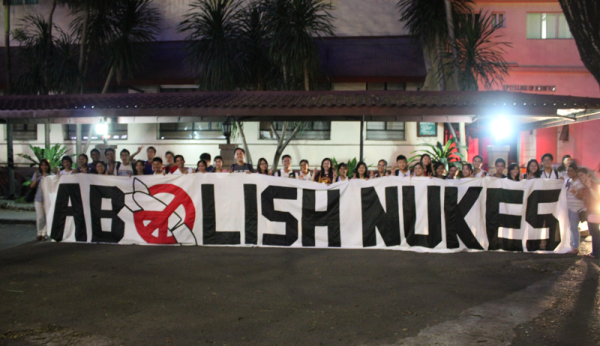As the four weeks of the nuclear Non-Proliferation Treaty review conference wraps up in New York without an outcome document being adopted, while the USA blames Egypt for the failure by insisting on moves towards a Middle East free of weapons of mass destruction, the most of the rest of the world had already given up on any coherent outcome having seen all their proposals for disarmament stripped out disdainfully by the nuclear-armed. We publish here the editorial of Reaching Critical Will who have brilliantly covered this four-week information-tsunami in their daily briefings.
The final document of the NPT Review Conference was prevented from being adopted by Israel—a non-state party. The US, UK, and Canada issued statements refusing to accept the proposal on convening a meeting about potentially developing a Middle East weapon of mass destruction free zone, thus preventing the adoption of what would have been the weakest disarmament outcome in the Treaty’s recent history. Instead, the outcome from this Conference is the Humanitarian Pledge, representing a commitment of more than 100 states to work for the prohibition and elimination of nuclear weapons.
The process to develop the draft Review Conference outcome document was anti-democratic and nontransparent. Several delegations, including ASEAN, expressed their sense of frustration with and exclusion from the process. The result was a text overwhelmingly reflecting the views and interests of the nuclear-armed states and some of their nuclear-dependent allies. It contained no meaningful progress on nuclear disarmament and even rolled back some previous commitments. South Africa lambasted the NPT for denigrating into rule of the minority, where the few have control even when it doesn’t make sense.
It is perhaps ironic, then, that three of these states prevented its adoption in the end, on behalf of a country that is not even party to the Treaty. The Review Conference President’s claim that the NPT belongs to all its states parties has never rung more hollow. The text resulting from this unacceptable process did not reflect the concerns, interests, or security of the majority of states parties or their publics. As a large, cross-regional group of 47 states argued in a statement delivered by Austria, the discussions during the Conference and resulting text demonstrated the “urgency to act upon the unacceptable humanitarian consequences of nuclear weapons,” but then fell “dramatically short of making credible progress on filling the legal gap.”
107 states— the majority of the world’s countries (and of NPT states parties)—have highlighted this legal gap and have committed to fill it, by endorsing the Humanitarian Pledge issued by Austria. These states have collectively demonstrated their empowerment by demanding that their security concerns be considered equal to those of the nuclear-armed states.
Now these states—and those that endorse the pledge after this Conference—must now use the pledge as the basis for a new process to develop a legally-binding instrument prohibiting nuclear weapons. This process should begin without delay. The 70th anniversary of the atomic bombings of Hiroshima and Nagasaki has already been identified as the appropriate milestone for this process to commence.
A treaty banning nuclear weapons remains the most feasible course of action for states committed to disarmament. This Review Conference has demonstrated beyond any doubt that continuing to rely on the nuclear-armed states or their nuclear-dependent allies for leadership or action is futile. As the 47 states represented in the Austrian statement highlighted, “The exchanges of views that we have witnessed during this review cycle demonstrate that there is a wide divide that presents itself in many fundamental aspects of what nuclear disarmament should mean. There is a reality gap, a credibility gap, a confidence gap and a moral gap.”
These gaps can be filled by determined action to stigmatise, prohibit, and eliminate nuclear weapons. “History honours only the brave,” declared Costa Rica. “Now is the time to work for what is to come, the world we want and deserve.” Those who reject nuclear weapons must have the courage of their convictions to move ahead without the nuclear-armed states, to take back ground from the violent few who purport to run the world, and build a new reality of human security and global justice.










